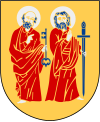Strängnäs Municipality
|
Strängnäs Municipality Strängnäs kommun |
||
|---|---|---|
| Municipality | ||
|
||
 |
||
| Country | Sweden | |
| County | Södermanland County | |
| Seat | Strängnäs | |
| Area | ||
| • Total | 975.08 km2 (376.48 sq mi) | |
| • Land | 739.7 km2 (285.6 sq mi) | |
| • Water | 235.38 km2 (90.88 sq mi) | |
| Area as of January 1, 2014. | ||
| Population (June 30, 2017) | ||
| • Total | 34,798 | |
| • Density | 36/km2 (92/sq mi) | |
| Time zone | CET (UTC+1) | |
| • Summer (DST) | CEST (UTC+2) | |
| ISO 3166 code | SE | |
| Province | Södermanland | |
| Municipal code | 0486 | |
| Website | www.strangnas.se | |
Strängnäs Municipality (Strängnäs kommun) is a municipality in Södermanland County in eastern Sweden, located by Lake Mälaren. Its seat is located in the city of Strängnäs.
The present municipality was created in 1971, when the City of Strängnäs was amalgamated with the City of Mariefred and a number of rural municipalities. Originally there were 15 local government entities in the area.
The municipality consists of the old towns of Strängnäs and Mariefred and the villages of Åkers styckebruk and Stallarholmen.
Strängnäs is an old town with a history dating back to the Viking era. Its location on the shores of Lake Mälaren has made Strängnäs an important trading centre and meeting place through the ages.
Mariefred acquired its name from the monastery Pax Mariae ("Mary's Peace") which was founded some 500 years ago by Sten Sture the Elder. There are no remains above ground of the monastery, which was the location where Mariefred's church, built in 1624, now stands.
Strängnäs has a multifaceted and dynamic economy, being home to businesses of different sizes and in many different sectors. The prominent industries are biotech, pharmaceuticals, logistics, education, engineering and tourism.
These are the results of the Riksdag elections of Strängnäs Municipality since the 1972 municipality reform. The results of the Sweden Democrats were not published by SCB between 1988 and 1998 at a municipal level to the party's small nationwide size at the time.
Blocs
This lists the relative strength of the socialist and centre-right blocs since 1973, but parties not elected to the Riksdag are inserted as "other", including the Sweden Democrats results from 1988 to 2006, but also the Christian Democrats pre-1991 and the Greens in 1982, 1985 and 1991. The sources are identical to the table above. The coalition or government mandate marked in bold formed the government after the election. New Democracy got elected in 1991 but are still listed as "other" due to the short lifespan of the party. "Elected" is the total number of percentage points from the municipality that went to parties who were elected to the Riksdag.
...
Wikipedia

